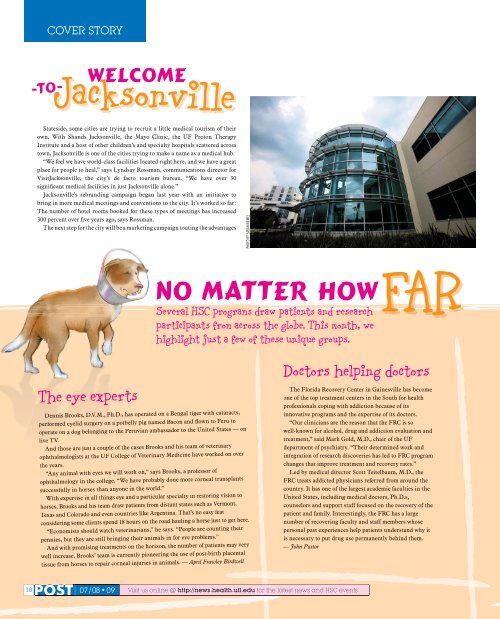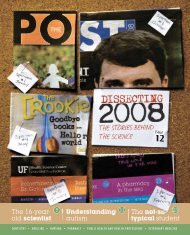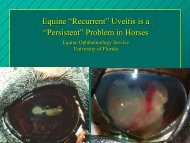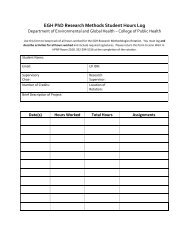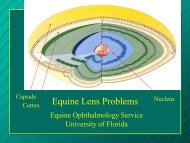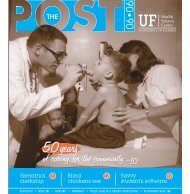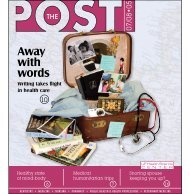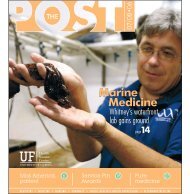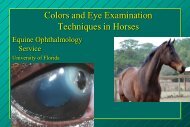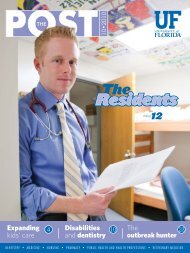COVER STORY-to-JacksonvilleWelcomeStateside, some cities are trying to recruit a little medical tourism <strong>of</strong> theirown. With Shands Jacksonville, the Mayo Clinic, the <strong>UF</strong> Proton TherapyInstitute and a host <strong>of</strong> other children’s and specialty hospitals scattered acrosstown, Jacksonville is one <strong>of</strong> the cities trying to make a name as a medical hub.“We feel we have world-class facilities located right here, and we have a great<strong>place</strong> for people to heal,” says Lyndsay Rossman, communications director forVisitJacksonville, the city’s de facto tourism bureau. “We have over 30significant medical facilities in just Jacksonville alone.”Jacksonville’s rebranding campaign began last year with an initiative tobring in more medical meetings and conventions to the city. It’s worked so far:The number <strong>of</strong> hotel rooms booked for these types <strong>of</strong> meetings has increased300 percent over five years ago, says Rossman.The next step for the city will be a marketing campaign touting the advantagesThe eye expertsDennis Brooks, D.V.M., Ph.D., has operated on a Bengal tiger with cataracts,performed eyelidsurgery on a potbelly pig named Bacon and flownto Peru tooperate on a dog belonging to the Peruvian ambassador to the United States — onliveTV.And those are just a couple <strong>of</strong> the cases Brooks and his team <strong>of</strong> veterinaryophthalmologists at the <strong>UF</strong> College <strong>of</strong> Veterinary Medicine have worked on overthe years.“Any animal with eyes we will work on,” says Brooks, a pr<strong>of</strong>essor <strong>of</strong>ophthalmology in the college. “We have probably done more corneal transplantssuccessfully in horses than anyone in the world.”With expertise in all things eye and a particular specialty in restoring vision tohorses, Brooks and his team draw patients from distant states such as Vermont,Texas and Colorado and even countries like Argentina. That’s <strong>no</strong> easy featconsidering some clients spend 18 hours on the road hauling a horse just to get here.“Eco<strong>no</strong>mists should watch veterinarians,” he says. “People are counting theirpennies, but they are still bringing their animals in for eye problems.”And with promising treatments on the horizon, the number <strong>of</strong> patients may verywell increase. Brooks’ team is currently pioneering the use <strong>of</strong> post-birth <strong>place</strong>ntaltissue from horses to repair corneal injuries in animals. — April Frawley BirdwellPOST07 / 08 • 09PHOTO BY SARAH KIEWELFARNo matter howSeveral HSC programs draw patients and researchparticipants from across the globe. This month, wehighlight just a few <strong>of</strong> these unique groups.Doctors helping doctorsThe <strong>Florida</strong> Recovery Center in Gainesville has becomeone <strong>of</strong> the top treatment centers in the South for healthpr<strong>of</strong>essionals coping with addiction because <strong>of</strong> itsin<strong>no</strong>vative programs and the expertise <strong>of</strong> its doctors.“Our clinicians are the reason that the FRC is sowell-k<strong>no</strong>wn for alcohol, drug and addiction evaluation andtreatment,” said Mark Gold, M.D., chair <strong>of</strong> the <strong>UF</strong>department <strong>of</strong> psychiatry. “Their determined work andintegration <strong>of</strong> research discoveries has led to FRC programchanges that improve treatment and recovery rates.”Led by medical director Scott Teitelbaum, M.D., theFRC treats addicted physicians referred from around thecountry. It has one <strong>of</strong> the largest academic faculties in theUnited States, including medical doctors, Ph.D.s,counselors and support staff focused on the recovery <strong>of</strong> thepatient and family. Interestingly, the FRC has a largenumber <strong>of</strong> recovering faculty and staff members whosepersonal past experiences help patients understand why itis necessary to put drug use permanently behind them.— John Pastor18 POSTVisit us online @ http://news.health.ufl.edu for the latest news and HSC events.
<strong>of</strong> its medical facilities and sunny locale to patients, Rossman says.The number <strong>of</strong> patients visiting Jacksonville each year has already increasedwith the establishment <strong>of</strong> the <strong>UF</strong> Proton Therapy Institute in 2006. The centersees 100 to 120 patients a day, and on average, about 80 are from out the area, saysGerry Troy, M.S.W., director <strong>of</strong> patient services for the institute.Getting patients involved in the community, visiting restaurants and playinggolf is good for the city, but more importantly, it’s good for the patients, Troysays. For patients dealing with cancer, sitting in a hotel room alone isn’t conduciveto healing. But having fun is, which is why the center works hard to get patientsto take part in events at the center and across town.“All they have to do is walk out that door and say, ‘I am a proton patient,’ andsomeone is going to buy them a beer,” Troy says. “That is the essence to me <strong>of</strong>Jacksonville as a medical hub. It’s <strong>no</strong>t just medical facilities. This is a <strong>place</strong> <strong>of</strong>healing. Jacksonville has become a national <strong>place</strong> <strong>of</strong> healing. It has more to <strong>of</strong>ferthan just about any city in the country.”It’s been nine months since Alex Barnes started his proton therapy inJacksonville, but he and his family recently came back for a checkup at the center.His doctors can’t give Alex a concrete prog<strong>no</strong>sis yet, his mother says, but so far,the tumor hasn’t returned.But the family has hope, she says, more hope than they may have had if theystayed in England instead <strong>of</strong> seeking proton therapy.“I am <strong>no</strong>t sure I would have my son <strong>no</strong>w (without it), and I would have feltguilty the rest <strong>of</strong> my life,” she said. “For my child’s life I would havegiven everything I have.”PHOTO BY SARAH KIEWELFamilies travel from across the country to participate in <strong>UF</strong> researchstudies about Duchenne muscular dystrophy. <strong>UF</strong> researchers usepushpins to mark where these families live on a map <strong>of</strong> the UnitedStates. (Opposite page) The <strong>UF</strong> Proton Therapy Institute sees between100 and 120 patients each day, with some patients traveling from as faraway as Saudi Arabia and England to be treated there.The littlest survivorsWhen Lisa Pannett was 16 weeks pregnant with hersecond child, doctors told her the baby had a zeropercent chance <strong>of</strong> making it.Her baby was diag<strong>no</strong>sed with congenitaldiaphragmatic hernia, a rare defect usuallyspotted on an ultrasound. A hole forms in thediaphragm that allows abdominal organsto growinto the chest cavity, hindering lung development.Unwilling to accept the prog<strong>no</strong>sis, Pannettsearched online and found David Kays, M.D., chief<strong>of</strong> pediatric surgery in the <strong>UF</strong> College <strong>of</strong>Medicine.Kays and his team use a gentler approach to treat theproblem, <strong>of</strong>ten delaying corrective surgery until after ababy’s lungs gain strength. Because <strong>of</strong> this, they have a 92 percentsurvival rate treating CDH babies born at Shands at <strong>UF</strong>, comparedwith 50 percent elsewhere.Pannett traveled from her home in St. Louis to have her babyhere so she could be treated after birth. Now 6, Bella, is thriving.“I really feel like (coming to <strong>UF</strong>) was God-sent,” Pannett says.But CDH is just one <strong>of</strong> the rare conditions <strong>UF</strong> pediatricians specialize intreating. Patients with childhood orphan diseases such as Pompe disease,e,glycogen storage disease and Prader-Willi syndrome come from all over to betreated here. For example, <strong>UF</strong>’s GlycogenStorage Disease program is thelargest <strong>of</strong> its sort in the world, seeing patients from 45 states and 20 countries.Many <strong>of</strong> these tiny survivors are also involved in research studies thatcould one day help cure their conditions. — April Frawley BirdwellFamilies committed to a cureResearchers in the College <strong>of</strong> Public <strong>Health</strong> and <strong>Health</strong> Pr<strong>of</strong>essions arestudying the progression <strong>of</strong> Duchenne muscular dystrophy with the help<strong>of</strong> a special group <strong>of</strong> young boys and their families. More than 40 boys,ages 5 to 14, who participate in two <strong>UF</strong> studies travel to Gainesville fromas far west as California and as far <strong>no</strong>rth as Maine, and from tw<strong>of</strong>oreign countries — Spain and Canada.Duchenne musculardystrophy only affects boys and by age 12many need a wheelchair. Patients <strong>of</strong>ten die in their late teens or 20s<strong>of</strong> cardiorespiratory failure. In the United States, about 400 to 600boys are born with Duchenne every year, according to the Centers forDisease Control and Prevention.The <strong>UF</strong> research team, led by Krista Vandenborne, Ph.D., principalinvestigator and chair <strong>of</strong> the department <strong>of</strong> physical therapy, uses magneticresonance imaging to produceprecise, <strong>no</strong>ninvasive assessments <strong>of</strong> muscletissue quality. The images allow researchers to determine the naturalprogression <strong>of</strong> the disease, the muscles that should be targeted for therapyand the efficacy <strong>of</strong> drug interventions.The families come to <strong>UF</strong> four to six times over a two-year period. No smallfeat considering the accommodations families need to make for work andschohoolol schedules, the special needs <strong>of</strong> the boys, who <strong>of</strong>ten use wheelchairs.“The families that participate in the research are tremendouslycommitted,” Vandenborne said. “They understand that in order to find acure we have to work togetheras a team — the parents, children andresesearchers.” — Jill PeaseVisit us online @ http://news.health.ufl.edu for the latest news and HSC events. 07 / 08 • 09POST19


